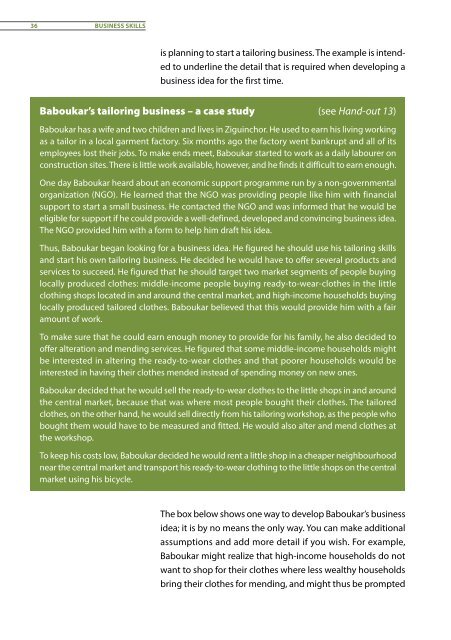new business module
You also want an ePaper? Increase the reach of your titles
YUMPU automatically turns print PDFs into web optimized ePapers that Google loves.
36<br />
BUSINESS SKILLS<br />
is planning to start a tailoring <strong>business</strong>. The example is intended<br />
to underline the detail that is required when developing a<br />
<strong>business</strong> idea for the first time.<br />
Baboukar’s tailoring <strong>business</strong> – a case study (see Hand-out 13)<br />
Baboukar has a wife and two children and lives in Ziguinchor. He used to earn his living working<br />
as a tailor in a local garment factory. Six months ago the factory went bankrupt and all of its<br />
employees lost their jobs. To make ends meet, Baboukar started to work as a daily labourer on<br />
construction sites. There is little work available, however, and he finds it difficult to earn enough.<br />
One day Baboukar heard about an economic support programme run by a non-governmental<br />
organization (NGO). He learned that the NGO was providing people like him with financial<br />
support to start a small <strong>business</strong>. He contacted the NGO and was informed that he would be<br />
eligible for support if he could provide a well-defined, developed and convincing <strong>business</strong> idea.<br />
The NGO provided him with a form to help him draft his idea.<br />
Thus, Baboukar began looking for a <strong>business</strong> idea. He figured he should use his tailoring skills<br />
and start his own tailoring <strong>business</strong>. He decided he would have to offer several products and<br />
services to succeed. He figured that he should target two market segments of people buying<br />
locally produced clothes: middle-income people buying ready-to-wear-clothes in the little<br />
clothing shops located in and around the central market, and high-income households buying<br />
locally produced tailored clothes. Baboukar believed that this would provide him with a fair<br />
amount of work.<br />
To make sure that he could earn enough money to provide for his family, he also decided to<br />
offer alteration and mending services. He figured that some middle-income households might<br />
be interested in altering the ready-to-wear clothes and that poorer households would be<br />
interested in having their clothes mended instead of spending money on <strong>new</strong> ones.<br />
Baboukar decided that he would sell the ready-to-wear clothes to the little shops in and around<br />
the central market, because that was where most people bought their clothes. The tailored<br />
clothes, on the other hand, he would sell directly from his tailoring workshop, as the people who<br />
bought them would have to be measured and fitted. He would also alter and mend clothes at<br />
the workshop.<br />
To keep his costs low, Baboukar decided he would rent a little shop in a cheaper neighbourhood<br />
near the central market and transport his ready-to-wear clothing to the little shops on the central<br />
market using his bicycle.<br />
The box below shows one way to develop Baboukar’s <strong>business</strong><br />
idea; it is by no means the only way. You can make additional<br />
assumptions and add more detail if you wish. For example,<br />
Baboukar might realize that high-income households do not<br />
want to shop for their clothes where less wealthy households<br />
bring their clothes for mending, and might thus be prompted


